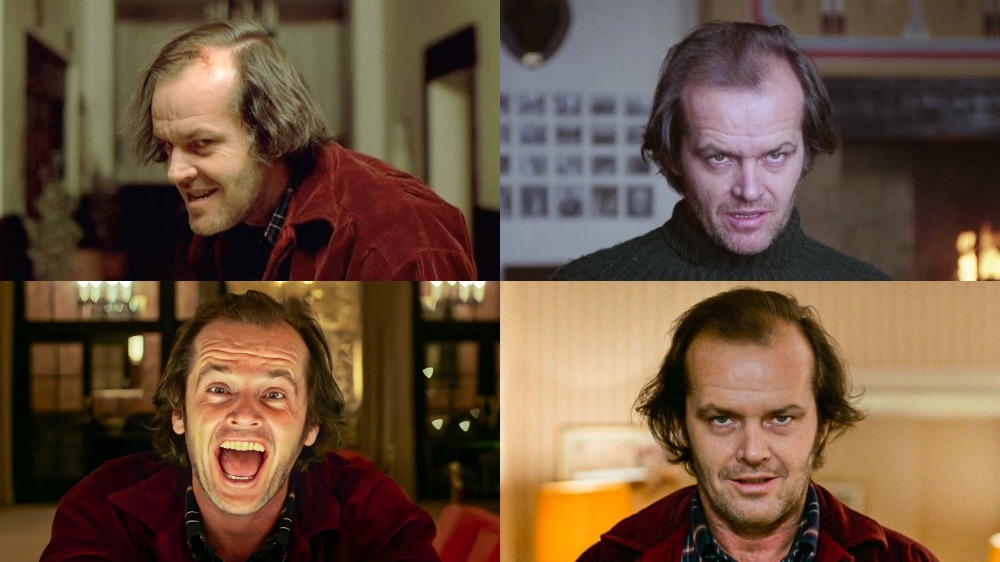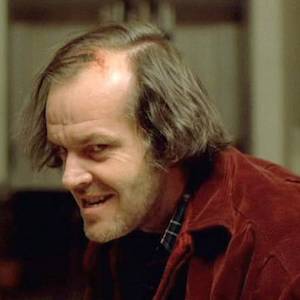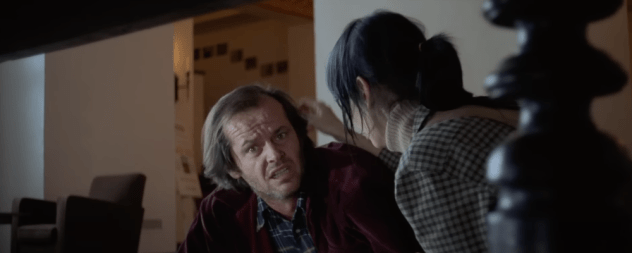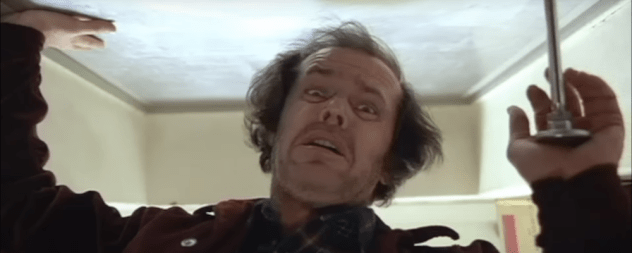
There are films that you can watch many, many times and every time you’ll see something new. Usually in the background. Not so much hidden but definitely not intended to grab your attention. It might be a small joke. It could be a clue to what is to come but, paradoxically, you only notice the clue after you know the answer. It could be a nod to another film. Ultimately though, lots of films have “blink and you’ll miss it” moments which allow geeks like me to irritate the life out of people who are unfortunate enough to spend time watching a film or a TV programme in my company.
“Did you see that?” I’ll say, pointing at the screen. My poor viewing companion will look st me in despair. “What now?” will doubtless be going through their mind while they are silently calculating how much a second TV set would cost. I’ll then point out some piddling little thing. To my mind, the rewatch is the main reason to buy tapes/discs/downloads which may well be the reason why directors include them. When Jilly was over here we talked about these little details; quite frankly, she is just as bad as I am. The running time of a film can double when we are together and the pause button glows red hot.
Join the PERA (Personal Entertainment Research Assistant) waitlist.
The World's Most Indispensable Movie App
The RunPee app tells you the best times to
run & pee during a movie
so you don't miss the best scenes.
Download the RunPee app.
100% free (donation supported)
All Work And No Play
One evening, we had one of our wine fuelled, wide ranging, world rightening discussions. As was quite common for us, we were discussing potential articles to, possibly, research and write. One thing that I wondered was this…did those one or two frame background gags actually exist before the home video industry took off in the late seventies? Before those days it was unusual to see a film more than a couple or three times. I can’t imagine that you’d pay good money to sit in the cinema and watch the background! Then further viewings would take place on your home TV screen. And I remember, back then, a 25” screen was huge!
So how do you think I felt when someone pointed something out to me about a film I’d seem many times. Furthermore, how do you think I felt when I found out it was much more than a random couple of frames? I was, quite simply, spellbound! The film in question was The Shining and the event is something that Jack Nicholson does…repeatedly! In the time honoured tradition of quizmasters and question setters throughout the ages, I’ll give you a while to see if you can think what I’m talking about.
What people are saying
about the RunPee app.
Single best investment
By and far best investment Ive made. I used to drive my husband nuts because Id be a fidgeting mess the last half hour of the movie trying not to miss important parts. Now I just turn this app on and *bam* I can actually focus on the movie the whole time. Even puts alerts to my watch so even better. Also I can guarentee all the 5
reviews arent fake as one person accused - its just that so many of us movie-goers had the same problem and this fixed it. Yes, it is paid but jeeze its expensive to keep watching movies and updating an app for every movie. And if you read more about the creator he mentions he has several people contributing - so yeah its paid but omg worth every cent. 10/10
Developers note: the RunPee app is now, and always will be, 100% free. Donations are optional.
View all reviews
Apple App Store | Google Play Store
Download RunPee app
Makes Jack A Dull Boy
I found out about it after a bit of idle Twitter browsing. I know that the whole thing about Twitter is that it is all about short snappy items. I did join when the character limit was a mere 140 which was exceptionally constricting for someone as verbose as myself. As is the way of these things, the tweets that were scrolling across my screen were from a variety of people and on a variety of topics. The one that caught my eye was from the director of Infinitum: Subject Unknown, Matthew Butler-Hart. It said, quite simply, “Ooh, read this. How have I never noticed?!”
It was a re-tweet of a thread from Filippo Ulivieri who is the author of Stanley Kubrick And Me: Thirty Years At His Side as well as a number of essays exploring the work and methods of the great man. The thread runs for fifty individual tweets and starts with “I’ve noticed something odd happening in Stanley Kubrick’s The Shining. True, there’s plenty of odd things going on in The Shining, but this is really weird.” So, is it something new or will I be just tutting and muttering “I knew that!”
Here’s Johnny!
It turns out that it is one of those things which you don’t believe when you’re first told, can’t believe when you are shown it, and are flabbergasted that you never noticed before hand! And, apart from one particular example, nobody else seems to have noticed either. Well, nobody has written anything about it that can be easily turned up. It is one of those things that, when it is pointed out to you, is like a slap around the face with a wet fish. You just sit, riveted to the screen, and count how many times you notice it. Sometimes it happens in a dark scene and you aren’t sure if it counts or not.
So what is this unusual occurrence that Filippo has noticed? Quite simply it is something that Jack Nicholson does, pretty much, throughout the film. No other character or actor does it, just Jack Nicholson/Torrance. It is something that happens in other films and TV programmes. We’ve all seen it used to, usually, comedic effect. The big difference is that in all the other uses it is obvious and you are meant to notice it. It is usually obvious and you are meant to acknowledge it and what it is doing. Woody Allen made a whole scene around it in Annie Hall. But, in The Shining, is runs from a single frame to a couple of seconds and it is never acknowledged or even meant to seem like it should be happening.
Redrum Redrum
It is, quite simply, a breaking of the fourth wall. Jack Nicholson repeatedly looks dead into the lens of the camera…many times! It isn’t in a knowing, “look what’s happening here” kind of way. It is just a glance ranging from a single frame up to about a second. If it were less experienced actor you might think that were distracted by the intrusion of the camera. If it were a last fastidious director you might think that it was an oversight or a case of not being bothered to reshoot because no-one will notice.
But then you remember that Stanley Kubrick’s method of working involved multiple takes. Thirty takes was the usual number of times he went over a scene. The Guinness world record for the most number of takes for a scene with dialogue is one hundred and forty eight. Yes, it is by Stanley Kubrick. Indeed it was the scene involving Dick Hallorann (Scatman Crothers) talking with Danny Torrance (Danny Lloyd) about the ability to ‘shine’. Any director who takes that many takes intends to get every detail just right.
Wendy, I’m Home
The infamous blood pouring from the lift scene took nine days to set up each time. In the end, it took three takes to get it right as Kubrick would film it and then say “It doesn’t look like blood.” Scatman Crothers’ next film was Bronco Billy with Clint Eastwood directing. When he realised that Mr Eastwood tending toward a one take only approach he wept with joy. According to his then girlfriend, Angelica Houston, Jack Nicolson was so exhausted by the multiple takes and retakes that he would often return from a day’s shooting, walk straight to the bed, collapse onto it, and fall immediately asleep. Even the poster had about three hundred redrafts before Kubrick was happy!
My immediate gut reaction is that this is not a mistake. Nicholson is too professional, Kubrick pays so much attention to detail, and it simply happens too often of it to be a mistake. Indeed, Filippo found a clip from a “shooting of” documentary which has Kubrick telling Nicholson to look into the camera. As Jack only glances down the lens rather than staring meaningfully, then my guess is that they both know the effect that they are going for. Whether it is scripted and prescribed along the lines of “Torrance stares into the camera for half a second” or something more laissez-faire, I really don’t know.
Come And Play With Us, Danny
So why does he do it? Again, this is something that I don’t know and, given that Stanley Kubrick died in 1999 and Jack Nicholson isn’t answering my calls, I don’t think there’ll ever be a definitive answer. Filippo has a couple of theories, both of which are eminently plausible. One is that it is an indication that Jack Torrance is aware of the ghosts that inhabit the Overlook Hotel from, pretty much, the first time he steps inside and that is what he is looking at. The first example of the camera stare is during the interview with the manager.
The other theory is the one that I feel is more likely given than this is a Stanley Kubrick film, The breaking of the fourth wall is used as a technique to bring the viewer into the story, to acknowledge their presence and involve them in the proceedings. In short, you know it’s happening and you accept that. However, in The Shining, Kubrick uses this at a subliminal level; it’s taken over forty years for someone to spot it so that counts as pretty damned subliminal in my book!
Great Party, Isn’t It?
Throughout the film you are witnessing Jack Torrance’s descent into becoming a deranged psychopath. However, at a very low level you are aware that he is watching you. He knows you are there and you are next. Just as very low frequency sounds can be used to unsettle people to make the next jump scare more intense, so the repeated glances at you prove to be unnerving. Especially when you don’t realise it’s actually happening!
Enough of my waffling on! I thoroughly recommend you do the following. Read through Filippo’s Twitter thread or watch the video version if you don’t have Twitter; I’ve put the link below. Then have another watch of The Shining and see how many times you can spot Jack Nicholson looking right at you! It’s never a hardship rewatching a classic example of Stanley Kubrick’s work but, I guarantee, you’ll never see it in the same way again!

Former teacher, lecturer, homelessness administrator, pharmacy dispenser now happily retired, happily married, and a very happy granddad. I live next to the Mersey but on the side Daniel Craig and Taron Egerton come from rather than the side the Beatles came from!









Interesting. I watched the video. I wish the glances at the camera lingered just a little more, to make it more obvious. My theory is that by looking at the camera and acknowledging the viewers Kubrick is intending to say something about fait. Because, the movie is recorded and will happen the same time, every time and there’s nothing anyone can do to stop it.
Just the same as Jack Torrance is going through the same events that happened to a previous character at the hotel. And after Torrance, it will happen again to another, and another. It’s fait.
Just my theory.
Comments are closed.